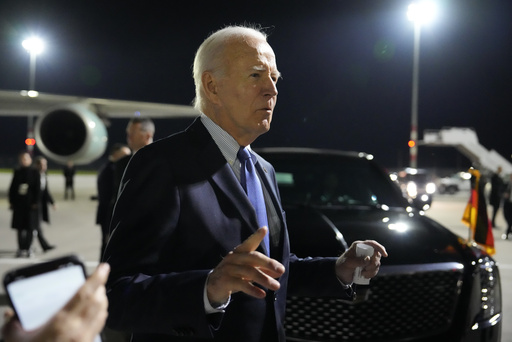
BERLIN — President Joe Biden is finding it difficult to avoid discussions surrounding Donald Trump, even during his overseas trip to Germany.
On Friday, he will engage in closed-door meetings with European allies, focusing on critical issues such as Russia’s ongoing conflict in Ukraine and the unrest in the Middle East. However, the proximity of the U.S. presidential election and its tight race raises concerns about the potential impact of a Trump victory on the international relationships Biden hopes to secure for his successor, Vice President Kamala Harris, the Democratic nominee.
As the Republican nominee, Trump has shown a willingness to impose tariffs on significant U.S. security partners and has demonstrated a lack of concern for the security situation in Ukraine. In a recent presidential debate, he failed to affirm support for Ukraine in its fight against Russia and has suggested he may hesitate to defend NATO allies if they face aggression.
Jake Sullivan, Biden’s national security adviser, spoke on Air Force One while en route to Berlin, dismissing the idea that Biden’s foreign policy aims to be “Trump-proof” due to the political overtones of that phrase. Nonetheless, Sullivan’s comments imply a desire to safeguard the military aid to Ukraine that Biden’s administration has provided over the past two years.
“President Biden is focused on making our commitment to Ukraine sustainable and institutionalized for the long haul,” Sullivan remarked, noting that fellow allies concurred that this approach is prudent. However, he reminded that Biden can only voice his own intentions and not those of a potential future president.
“What President Biden has done over the last four years is outline his vision for America’s role in the world, steering priorities towards what he believes serves America’s national security and is in the interest of our close allies,” Sullivan said. “He can’t presuppose decisions made by others.”
Trump asserts that his policies would bolster the U.S. economy and prevent foreign nations from exploiting it. He believes that under his presidency, Russia would not have invaded Ukraine in 2022 and that Hamas would not have launched its attack on Israel in 2023.
“I will bring an end to the war in Ukraine, stabilize the Middle East, and avert a third world war,” Trump declared during a recent rally in Georgia, claiming he is capable of achieving these goals.
At home, Biden has engaged in a verbal skirmish with Trump regarding misinformation related to the federal response to hurricanes, labeling the latter’s willingness to disseminate false narratives as “un-American.”
Kamala Harris has expressed firm support for Ukraine, aligning herself with Biden’s stance on Israel while also emphasizing the importance of addressing the plight of Palestinian civilians affected by the conflict ignited by Hamas.
Biden often communicates to international leaders that “America is back” in terms of engagement after the Trump administration. However, he recounts that skepticism still lingers among some leaders, who frequently question how long this renewed commitment will last.
Determined to visit the German capital before his presidency concludes, Biden has already engaged with other significant allies, including Japan, South Korea, France, India, the U.K., Poland, and Ukraine.
His Friday schedule initiates with a meeting at Bellevue Palace with German President Frank-Walter Steinmeier, followed by receiving Germany’s Order of Merit, an accolade previously awarded to former President George H.W. Bush for his role in supporting German reunification.
Biden will then convene with German Chancellor Olaf Scholz, and they will later join French President Emmanuel Macron and U.K. Prime Minister Keir Starmer to discuss next steps in Ukraine and the recent developments surrounding Israel and Gaza subsequent to the death of Hamas leader Yahya Sinwar. Their conversations will also cover issues related to Lebanon, Iran, and a coordinated strategy towards China, along with discussions on industrial, innovation policies, artificial intelligence, and renewable energy initiatives.
While Biden intends to underscore the significance of democratic values on this trip, he has opted out of holding a news conference for media inquiries. Sullivan countered the premise that not holding a press conference undermines commitment to democratic values, insisting that questioning Biden’s dedication based on a temporary structure of his press engagements is unreasonable.
